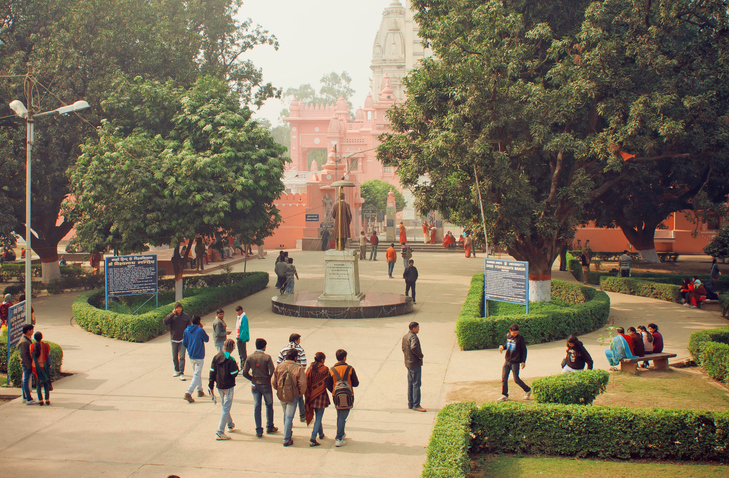Applying to university in Kazakhstan
Kazakhstan is home to diverse cultures, striking landscapes, copious oil and gas reserves – and a government actively pursuing the internationalisation of higher education

Kazakhstan, located in Central Asia, is the world’s largest landlocked country and the ninth largest overall. It has a rich history as part of the Silk Road, and houses vast natural resources, including significant oil and gas reserves.
The country is known for its diverse culture, influenced by a mix of ethnic groups, and its striking landscapes ranging from expansive steppes to mountainous regions.
Since gaining independence from the Soviet Union in 1991, Kazakhstan has pursued economic reforms and development, becoming a significant regional power. The government is actively supporting the internationalisation of higher education. One of the prominent examples is Nazarbayev University, which reached the 501-600 band in the Times Higher Education World University Rankings, 129th spot in the THE Asia University Rankings and 106th in the THE Young University Rankings.
This guide provides a detailed overview of the application process to Kazakh universities, including application forms, visa guidance, funding opportunities, a list of universities offering study programmes in English and those with international collaborations.
Choosing where to study in Kazakhstan
Key universities in Kazakhstan offering programmes in English include:
Location: Nur-Sultan (Astana)
Programmes: various undergraduate, graduate and doctoral programmes across disciplines such as engineering, science, social sciences, humanities, business and medicine
Location: Almaty
Programmes: business, social sciences, law, international relations, journalism and economics
3. Al-Farabi Kazakh National University
Location: Almaty
Programmes: science, engineering, humanities, business and international relations
Location: Aktobe
Programmes: collaborative programmes with Edinburgh’s Heriot-Watt University, including business and engineering
5. Suleyman Demirel University (SDU)
Location: Almaty
Programmes: information technology, business administration, law, education and social sciences
6. Kazakh-British Technical University (KBTU)
Location: Almaty
Programmes: engineering, information technology, business, and petroleum industry-related courses
7. LN Gumilyov Eurasian National University
Location: Nur-Sultan (Astana)
Programmes: engineering, natural sciences, social sciences and humanities
8. International Information Technology University (IITU)
Location: Almaty
Programmes: information technology, business administration and telecommunications
9. South Kazakhstan State University (SKSU)
Location: Shymkent
Programmes: engineering, technology, natural sciences and social sciences
How to apply to university in Kazakhstan
Each university has its own application process. Most universities have an online application portal, where students can create an account and submit their applications.
International applicants can submit their applications online, via the universities’ websites, whereas Kazakhstani citizens must submit documents through a governmental centralised system.
Students are usually required to pay an application fee. This varies by university – for example, the application fee for SDU is USD$200.
Required documents often include:
- Copy of passport
- Academic transcripts and diplomas
- Statement of purpose
- Letters of recommendation
- Proof of English proficiency (for example, IELTS or TOEFL)
- CV or résumé.
Application deadlines vary, so it is crucial to check each university’s own deadline. Generally, application deadlines for Kazakhstani universities fall between 1 June and 25 August. However, Nazarbayev University’s programmes follow different timelines, opening up admission in February-March each year.
Applying for a visa
Students need a student visa (type C9) to study in Kazakhstan. To apply for a visa, students must have the following:
- Acceptance letter from the university
- Visa application form, available on the website of their local Kazakhstan embassy
- Passport valid for at least six months beyond the end of their intended stay
- Passport-sized photographs
- Some embassies require a medical certificate indicating that they are free from contagious diseases
- Evidence of sufficient funds to cover tuition fees and living expenses.
Students must submit the completed visa application form along with the required documents to their nearest Kazakhstan embassy or consulate. They may subsequently be required to attend an interview.
Depending on country of origin, the visa application fee is usually about USD$200.
Funding opportunities
Many universities offer merit-based scholarships for international students. For example, Nazarbayev University provides a range of scholarships covering tuition and living expenses.
Scholarships from external organisations and international bodies, such as the Erasmus+ programme, are also available.
Careers advice
Universities in Kazakhstan are increasingly appearing in international rankings, reflecting their commitment to quality education and links with the workforce.
Nazarbayev University has a career and advice counselling centre, which prepares university graduates for their future careers by collaborating with workplaces, such as Astana Hub, located in Nur-Sultan (formerly Astana), which is the largest international technology park in Central Asia.


